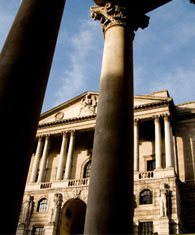 The Bank of England (BoE) was urged to slash interest rates and print more money after yesterday’s official figures painted a dire picture of a country in a deepening slump. Michael Saunders, a UK economist at Citigroup, said that Britain was experiencing a depression and that the authorities needed to “turn the taps on full-scale” to pull the economy out of its nosedive. That could involve reducing the Bank Rate to nearly zero, he said, compared with 0.5 per cent now. Simon Kirby, of the National Institute of Economic and Social Research, described the 0.7 per cent drop in Gross Domestic Product in the second quarter as “shocking” and said: “If this weakness persists, the Bank of England will have to use as many tools as it can, including rate cuts.” However, Peter Spencer, of the Ernst & Young Item Club, dismissed the grim numbers from the Office for National Statistics, saying that business surveys pointed to a stronger economy and that his advice to British authorities was to “hold your nerve,” The Times explains.
The Bank of England (BoE) was urged to slash interest rates and print more money after yesterday’s official figures painted a dire picture of a country in a deepening slump. Michael Saunders, a UK economist at Citigroup, said that Britain was experiencing a depression and that the authorities needed to “turn the taps on full-scale” to pull the economy out of its nosedive. That could involve reducing the Bank Rate to nearly zero, he said, compared with 0.5 per cent now. Simon Kirby, of the National Institute of Economic and Social Research, described the 0.7 per cent drop in Gross Domestic Product in the second quarter as “shocking” and said: “If this weakness persists, the Bank of England will have to use as many tools as it can, including rate cuts.” However, Peter Spencer, of the Ernst & Young Item Club, dismissed the grim numbers from the Office for National Statistics, saying that business surveys pointed to a stronger economy and that his advice to British authorities was to “hold your nerve,” The Times explains.
The UK’s deepening recession will cost the country its cherished triple-A credit rating, leading bond investors warned after output fell 0.7% in the three months through June. Leading investors said that the foundering economy, which economists had projected would shrink 0.2% in the second quarter, was confounding George Osborne’s ambitious austerity programme and is likely to spur Moody’s to strip the UK of its top rating . Moody’s put the UK on negative outlook in February this year. “The data are shocking and no amount of excuses about rainfall or the Queen’s Jubilee can explain away such weak growth,” said Alan Wilde of Baring Asset Management, according to The Financial Times.
Jerry del Missier, the former Barclays Bank executive at the centre of the interest-rate rigging scandal that cost the lender £290m, has walked away with a pay-off of almost £9m. Mr del Missier, the bank’s former chief operating officer who resigned three weeks ago, is understood to have negotiated the deal with Barclays’ outgoing chairman Marcus Agius in the days before he quit. The pay-out looks certain to trigger another political storm over bankers’ pay. Mr del Missier was one of Barclays’ highest-paid executives, receiving a salary and bonus package for 2011 worth £6.7m plus a further £10.8m from share awards from previous years. He became co-head of the investment bank in January 2011, when former chief executive Bob Diamond was promoted to the top job, but emerged as a leading figure in the Libor rigging scandal, The Telegraph says.
The US Treasury Secretary made his most direct criticism of Sir Mervyn King and the Bank of England (BoE) yesterday when he blamed them for failing to prevent the interest rate-rigging scandal. Timothy Geithner said that it had been up to the Bank and its Governor to address concerns about manipulation of the London interbank offer rate when they were raised in 2008. Mr Geithner wrote to Sir Mervyn when he was president of the New York Federal Reserve Bank to alert his counterpart to the potential problems with Libor. Mr Geithner said: “In detailed recommendations we gave to the British, we identified a series of specific things that would make it impossible for banks to manipulate the rate. If these had been adopted it would have severely reduced, or eliminated, the risk going forward.” Under questioning by British MPs last week, Sir Mervyn defended his lack of action by claiming that the Fed had not made him aware of any specific evidence of wrongdoing relating to Libor, The Times says.
George Osborne faced calls from business leaders to do more to kick-start Britain’s economy on Wednesday after official figures showed that the country has fallen into the worst double-dip recession for more than 50 years. The economy shrank by 0.7% between April and June, the Office for National Statistics said. It is now smaller than when the Coalition came to power in 2010. Since then, the Chancellor has pursued a strict policy of austerity – “Plan A” – in an attempt to bring down the deficit, leading to accusations that he has not done enough to stimulate growth. Wednesday’s fall was worse than expected and means that Britain is firmly back in recession, with negative growth for the past nine months. Amid a growing clamour from business groups for radical action, one senior Conservative figure admitted that the economy was likely to be in “intensive care” for another two years, The Telegraph says.
Heathrow-owner BAA has cautioned that Britain is at risk of discouraging foreign investment in UK infrastructure. BAA has warned that a forced sale of Stansted airport in the current depressed market will discourage foreign investors from backing UK infrastructure projects. The airports operator cautioned against sending the wrong signal to overseas investors as it awaits the outcome tomorrow of its final appeal to keep hold of Stansted. A ruling is expected in the latest twist in a three-year legal battle between BAA and the Competition Commission, which in 2009 ruled that Stansted must be sold. If tomorrow’s judgment from the Court of Appeal doesn’t go BAA’s way, the airports operator will be forced to sell the Essex airport according to a timetable laid out by the Commission, The Telegraph reports.
Onshore wind farms yesterday escaped the worst of mooted cuts to subsidies for renewable energy, but industry leaders have warned that further reviews will continue to undermine investment in the sector. The Department of Energy & Climate Change (Decc) confirmed a 10% cut in payments for onshore wind projects after protracted negotiations in which some had suggested cuts of up to 25%. However, the new subsidy levels will be subject to a further review later this year, with subsequent changes to take effect in 2014. Euan McVicar, partner in energy at Pinsent Masons, said this meant payment levels were only guaranteed for one year. “Perhaps in response to those who wanted a greater reduction at this time, there is to be yet another consultation as it applies to onshore wind and possible further review that would be effective from 2014,” McVicar said, according to The Scotsman.
The controversial director who signed off an £18m pay package for former Barclays boss Bob Diamond has become the fourth senior executive to quit in the wake of the Libor-rigging scandal. Alison Carnwath, the non-executive director who heads up the remuneration committee, resigned citing ‘personal reasons’. The news emerged just hours before reports of a £8.75m payoff for former chief operating officer Jerry del Missier. It also came as the European Commission proposed to make a criminal offence the fixing of Libor, which is used as a benchmark for mortgage rates and trillions of pounds of investment products. Justice commissioner Viviane Reding said the move would help ‘put an end to criminal activity in the banking sector’, The Daily Mail reports.

